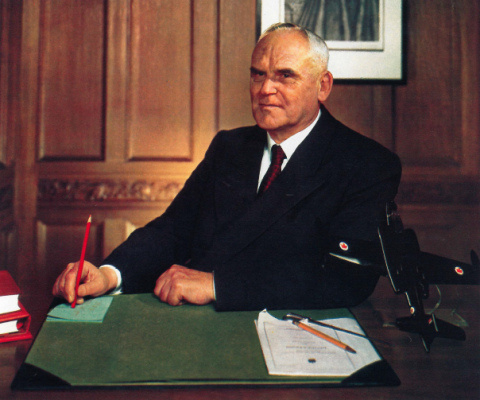The C.D. Howe Institute’s roots are in Montreal in 1958 when a group of prominent business and labour leaders organized the Private Planning Association of Canada (PPAC) to research and raise awareness of issues related to public economic policy. The PPAC was the Canadian co-sponsor for the Canadian-American Committee (CAC), which had been established in 1957 to study and discuss economic relations between Canada and the United States.
Under the leadership of Robert M. Fowler, the PPAC enhanced its reputation as a serious research institution by publishing, alone or with the CAC, such renowned economists as Harry Johnson, Robert Mundell, Ed Neufeld, Grant Reuber, Ed Safarian, David Slater, and David C. Smith during the 1960s.
In 1973, the PPAC became dormant. Its assets and activities became part of the C.D. Howe Memorial Foundation, created in 1961 to memorialize the late Right Honourable Clarence Decatur Howe (left). The Foundation adopted the name C.D. Howe Research Institute.Headed by Carl E. Beigie, the organization greatly expanded the scope of its research, notably into energy, fiscal policy, labour policy, and monetary policy.
1982 saw two important changes. The Memorial Foundation reverted to its former name, focusing directly on memorializing C.D. Howe, and the PPAC revived with the name that survives to this day: the C.D. Howe Institute. After more than 20 years in offices in Montreal’s Sun Life Building, the Institute moved its headquarters to Toronto.
Shortly after the move to Toronto, Carl Beigie handed the reins to Executive Director Wendy Dobson, whose force and dynamism guided the Institute through the early to mid-1980s. In 1986, Maureen Farrow, an economist well respected in the investment community, became president. During the 1980s, the Institute was a major voice on such key challenges as inflation control, budget deficits, and Canada-U.S. trade liberalization.
In 1989, esteemed investment banker Thomas E. Kierans became president of the Institute. Over the next 10 years, the Institute cemented its reputation as a leader among Canadian think tanks. Among its landmark projects during those years were a series of studies on social policy and Canada’s constitution.
From 1999-2006, Jack M. Mintz, a highly accomplished academic specializing in public economics and tax policy, headed the Institute. He spearheaded influential work on the impact of taxation on investment, jobs and economic growth, and the Institute made signal contributions in North American economic and security cooperation, labour markets and financial services. The Institute’s Senior Vice President and Director of Research, Bill Robson, was a major voice on fiscal policy, pensions, and monetary policy – including establishing the C.D. Howe Institute’s Monetary Policy Council, which provides recommendations in advance of the Bank of Canada’s policy interest-rate setting.
In 2006 Robson took the helm. Under his leadership, the Institute’s research has expanded further, with policy councils covering fiscal and tax policy, financial services, retirement saving and income, international economics, healthcare, energy, competition policy, human capital, monetary policy and business cycles. Its influence on debate and policy ranges from demographics and fiscal sustainability, through tax competitiveness, trade agreements, foreign investment, and the quality of public-sector financial reporting, to education and social supports. Its publications have won awards from the Canadian Economics Association and the Donner Canadian Foundation, and its network of academic and senior fellows is the best in the country. Whether offering analysis relevant to solving identified problems, or exploring emerging challenges, the C.D. Howe Institute’s mission as an educational charity to research and foster debate about ways to enhance Canadian prosperity and living standards is as relevant as ever.

